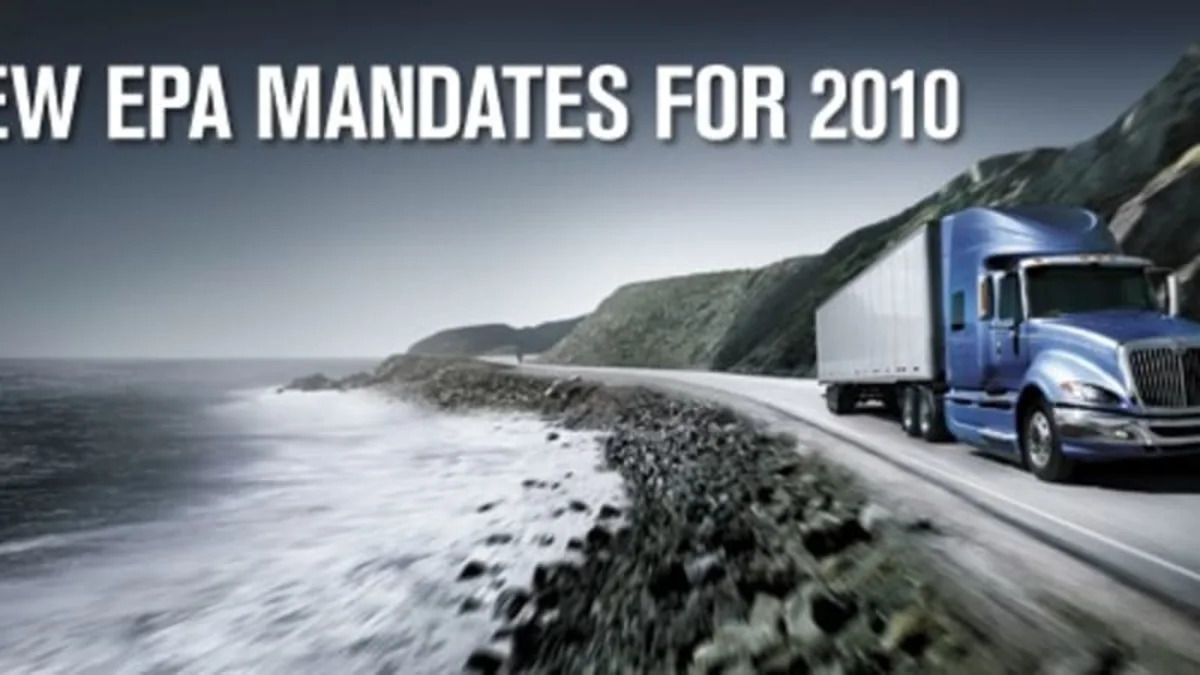In a lawsuit filed earlier this month, Navistar, a U.S.-based manufacturer of heavy-duty diesel engines, accused U.S. Environmental Protection Agency director, Lisa Jackson, of not upholding the Clean Air Act and the Agency of not acting to protect public health.
If what Navistar is claiming turns out to be true, heavy-duty trucks manufactured in 2010 and beyond will not be subject to guidelines for nitrogen oxides emissions laid out in the Clean Air Act. After discussing the issue with the EPA months ago, Navistar decided to move forward by filing a suit.
Here's the gist of Navistar's argument: Back 2001, when the EPA issued limits for nitrogen oxides, diesel engine manufacturers have been designing solutions to meet the Agency's 2010 deadline. Now, with thousands of model year 2010 trucks on the roads, Navistar says the majority of other engine manufacturers have failed to develop a system that meets the EPA's Clean Air Act guidelines.
You see, most of Navistar's competitors have chosen an emissions-control system that relies on fluid (i.e. an aqueous urea solution such as AdBlue) to limit the release of nitrogen oxides. Navistar says that since a urea-based solution (commonly referred to as selective catalyst reduction or SCR) relies on drivers monitoring fluid levels, it's a possibility that some trucks will be operated without the emissions-controlling fluid. Essentially, Navistar says that when the fluid runs dry, emissions skyrocket, thus rendering the EPA's rule "irrelevant." The key point here being that Navistar doesn't use a urea-based emissions-controlling fluid and, therefore, its engines meet Clean Air Act guidelines without relying on driver input.
Yes, some fluid-based setups disable a truck when the driver neglects to fill up the system. However, Navistar claims that online message boards abound with ways to evade some of the systems (i.e. filling the tank with water). Navistar's suit alleges the EPA certified the competitors' systems without checking whether they work to reduce emissions in all situations. Since numerous diesel-engined passenger vehicles come equipped with SCR systems, the result of this lawsuit could have an impact on the automotive industry,
[Source: Springfield News-Sun]
If what Navistar is claiming turns out to be true, heavy-duty trucks manufactured in 2010 and beyond will not be subject to guidelines for nitrogen oxides emissions laid out in the Clean Air Act. After discussing the issue with the EPA months ago, Navistar decided to move forward by filing a suit.
Here's the gist of Navistar's argument: Back 2001, when the EPA issued limits for nitrogen oxides, diesel engine manufacturers have been designing solutions to meet the Agency's 2010 deadline. Now, with thousands of model year 2010 trucks on the roads, Navistar says the majority of other engine manufacturers have failed to develop a system that meets the EPA's Clean Air Act guidelines.
You see, most of Navistar's competitors have chosen an emissions-control system that relies on fluid (i.e. an aqueous urea solution such as AdBlue) to limit the release of nitrogen oxides. Navistar says that since a urea-based solution (commonly referred to as selective catalyst reduction or SCR) relies on drivers monitoring fluid levels, it's a possibility that some trucks will be operated without the emissions-controlling fluid. Essentially, Navistar says that when the fluid runs dry, emissions skyrocket, thus rendering the EPA's rule "irrelevant." The key point here being that Navistar doesn't use a urea-based emissions-controlling fluid and, therefore, its engines meet Clean Air Act guidelines without relying on driver input.
Yes, some fluid-based setups disable a truck when the driver neglects to fill up the system. However, Navistar claims that online message boards abound with ways to evade some of the systems (i.e. filling the tank with water). Navistar's suit alleges the EPA certified the competitors' systems without checking whether they work to reduce emissions in all situations. Since numerous diesel-engined passenger vehicles come equipped with SCR systems, the result of this lawsuit could have an impact on the automotive industry,
[Source: Springfield News-Sun]


Sign in to post
Please sign in to leave a comment.
Continue